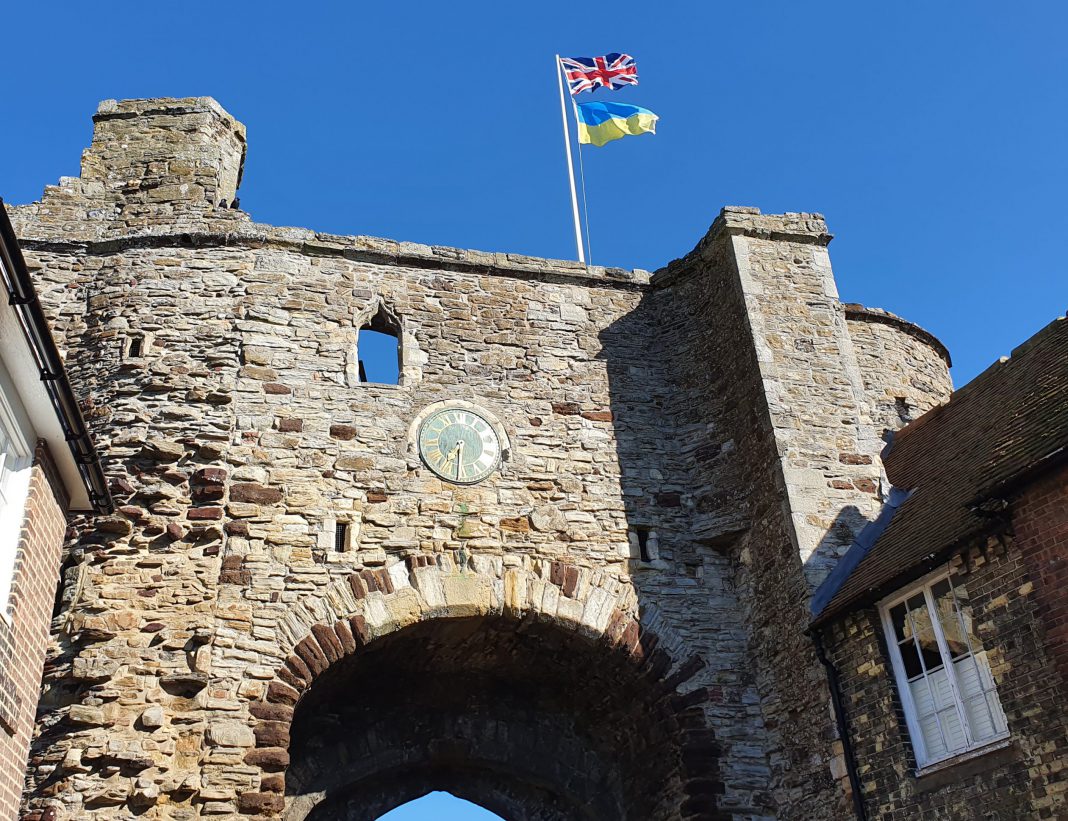“Where liberty is, there is my country”
Benjamin Franklin
When I wrote my April piece about the Winchelsea Second Wednesday Society, I thought that I had ended it quite neatly. The article started with the effects of war on children in the 1940s and, thanks to current affairs, was bookended tragically with children in 2022. And that’s where I’d planned to finish. But then a strange thing happened.
I started noticing Ukrainian flags. First in bedroom windows, then hanging from those windows; a “Cook for Ukraine” poster appeared in the Lazy Bakery at the Whitehouse, followed by a flag. Flags now fluttered from poles along the A21; from churches, outside pubs and even over the Landgate, which shows that decisions and choices had not just been made at personal levels.
I am the product of immigration.
After studying at Cambridge in the 1930s, my Romanian grandfather fought for his adopted country and all the while my French grandmother had to report to the police station weekly, as she was married to an enemy alien. She was asked to do work at “country houses” because of her language skills. A Desert Rat, he was killed at El Alamein, leaving her to bring up a baby single handed. Unable to return to France, she was taken in by friends in Sussex. After the war, she moved to London and this is where my mother was raised.
My Greek father was born in Tanzania and because it was a British colony, naturally came to university in England. He too stayed. He worked at the Sunday Times, where he met my mother. He changed jobs many times before finding his niche and finally becoming a chef. An independent trailblazer, he ended up reaching the highest level of his chosen career.
My husband came to England after his studies in Italy, to join his parents who had already made the move. He has now spent sixty years at the forefront of hospitality, heading its most respected trade bodies. He mentors and guides new generations of front of house professionals, in an industry that is the third largest private sector employer in the county.
Our relationship towards immigration is very complex. As an island nation we are simultaneously welcoming and terrified of its consequences. By their very nature, the great port towns and cities become a microcosm of the world. Add to that the legacy of Empire and the fact that about a third of the world’s countries have English as an official language. The values of freedom and democracy are a draw for those who may have none of the previous attachments. From a physical, emotional and intellectual point of view, the magnetism of the United Kingdom is obvious. Charismatic men have been elevated to the House of Lords for their tireless work, maintaining and furthering these traditions, particularly for children. Others, have sown the seeds of division and fear.
Being born and brought up in the capital, particularly in the hospitality industry, there are no such thing as foreigners, just Londoners. My family is not unique or exceptional. You grow up knowing that the majority of people have the same priorities and aspirations, no matter what they look like or where their families are from. This way of life and view of my country seemed to have become an illusion of late. So now, seeing all these flags reminds me of past generations, as well as those to come and fills my heart with pride and hope for the future.
Image Credits: Natasha Robinson .




I was on duty for a wedding outside the Town Hall a couple of weeks ago, when a pair of tourists asked me what the connection was between Rye and Ukraine – there were so many Ukrainian flags around town that they had assumed we had some special link to the country!
It made me feel very proud of Rye!
I think the instincts of the public with respect to Ukraine – albeit energetically shaped by the government and the media – are really admirable. I’m also struck by the ubiquitousness of the hitherto practically unrecognisable Ukrainian flag. I do think it does us credit. I also think it stands in very stark contrast to the Govt’s grubby Rwandan wheeze. Presumably, something Priti Patel borrowed from her Israeli chum, Benjamin Netanyahu, who got rid of thousands of Sudanese and Eritrean asylum-seekers by the same sordid means… Or perhaps she was inspired by the UK’s export of landfill? Is there such a thing as human rubbish? Rwanda’s probably as obscure to the average person as Ukraine, but even so, the name still chills, as our consciousness of the place hasn’t moved on much since the gory genocide of the mid-90s. We know, instinctively, this doesn’t feel right. But today it’s hardly a beacon of freedom and democracy in the African continent. Which is why Justin Welby raised an ecclesiastical eyebrow. Michela Wong in The Spectator provides some further context too:
“In 2018 the Congolese inhabitants of Kiziba, one of Rwanda’s six refugee camps, protested at having their miserly $9 monthly food rations cut to $6. Rwandan police opened fire on a demonstration, with a dozen killed. Community leaders from the camp were prosecuted and are still in jail.”
She notes the regular disappearances, corruption and repression too. A fit place for vulnerable refugees? Curiously, Priti Patel thinks so…